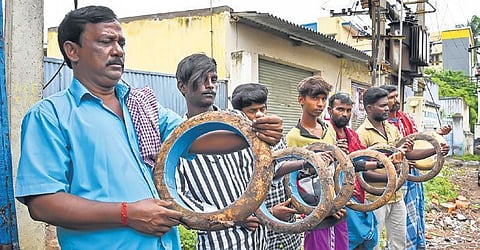

TIRUCHY: "When a livelihood dies, a way of life vanishes, and the language too diminishes," says Tamil writer Cho Dharman. The COVID-19 pandemic has put to test, a lot of such livelihoods that are native and ancient to our land. One such is the performing art of playing the 'Thappu' instrument.
With no bookings in his calendar, N Ganesan (50), a thappu artist from Sengkulam Colony safely stored his instrument on the cupboard at his house. When he opened it after months, he was appalled to see his instrument in a damaged state.
Restrictions imposed by the government on funeral processions and religious events sounded the death knell to artists like Ganesan. There are as many as 400 thappu artists, who are Dalits, in Tiruchy, illustrating how the profession and caste are intertwined in the lives and livelihoods of many people.
They would be hired to perform at funerals, temple festivals, and political events; but did not have any work since March. "So many people died of Covid and other ailments during the last eight months. All we could do was watch the news on TV. We were not called to play in any funeral. Without income, our families struggled even for hand-to-mouth existence, let alone other expenses," lamented Ganesan.
Selvi, the grey-haired mother of thappu artists – Gunasekar and Poovendran – recalled that the family bought black tea to quench the hunger and thirst, even for the children, during the lockdown. Her sons still do not see any light at the end of the tunnel. Selvi got into ragpicking to support her family.
"The first six months were the worst for us. Only after the shops opened, I could find old, used bottles and other scraps on the road sides to collect. I make around Rs 200 a day, and we run the family with it," she said.
Thappu artists, who had work almost every other day before the lockdown set in, earned Rs 700 each for playing at funerals. It was only the rice distributed through PDS shops that saved the, as they had no money to buy vegetables or groceries.
"Two people in our area worked in hotels. They brought leftover sambar every night and sold it for Rs 5 or Rs 10. We survived on ration rice and the sambar during the lockdown days," said R Lakshmanan.
Most of the thappu artists of Sengkulam Colony live in Tamil Nadu Slum Clearance Board (TNSCB) tenements. They have not paid rent for the past eight months and are worried that officials may demand the due rent from them anytime.
"Even to pay the electricity bill, we had to borrow money for interest. Nowadays, nobody is lending us money. How can we pay the rent?" asked Selvi, pointing to the bleak situation. Their priority now is to repair the damaged instruments.
Unused for long and weather worn, the hides are torn. "Had we got work, we could have maintained and seasoned them regularly. We kept them unattended for months together, as a result, instruments are damaged. Now, we require at least Rs 1,500 to repair one thappu," said Ganesan.
Selvam (57) in Tiruchy, said, "Just a few days before lockdown, we spent Rs 30,000 to repair our instruments with new cowhides. Now all of them are damaged. We need the same amount of money once again to get them ready. Where will we go for that?"
Some of the artists are members of the Tamil Nadu Folk Artists Welfare Board andreceived Rs 2,000 as relief from the government during lockdown, while others did not. “The culture and art forms that we take pride in are dangling in air crying for help. Will we able to save our artists who, in turn, would save the art and us?” he asked.